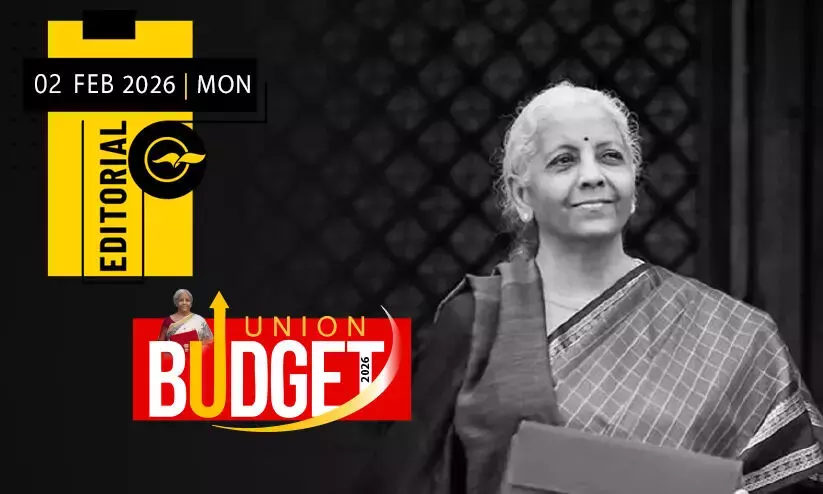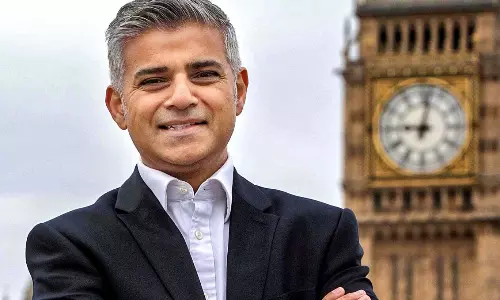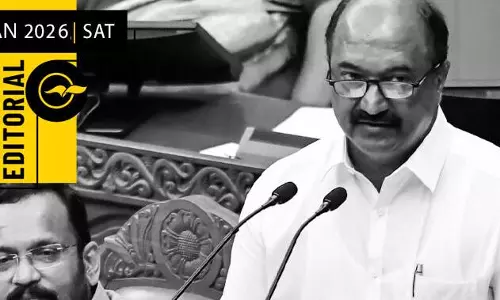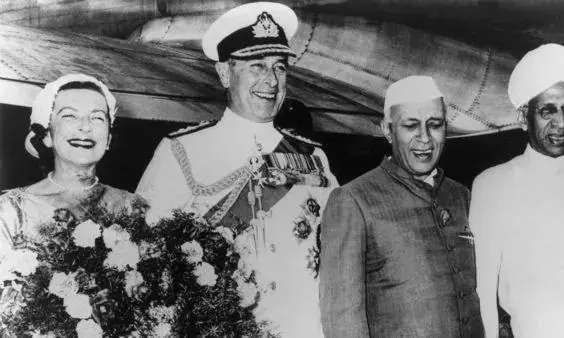
A vanity-driven viceroy, a principled wife: The Mountbattens by Andrew Lownie
text_fieldsThe biography is the first joint biography of Earl Mountbatten of Burma and his goodwife Countess Mountbatten. There have been several biographies of Lord Louis Mountbatten, as well as at least one of his spouse, Edwina. Mountbatten is best known for having been the last Viceroy of India.
Andrew Lownie writes with verve and pace. The prose is pellucid, and the personalities of people are brought to life with ample vignettes. These pen portraits never interrupt the flow. The book includes many quotations that illuminate the narrative. There are ample citations from journals, newspapers, personal letters and official documents, some of which were public at the time and some of which were secret until recently.
The lexis is middle brow: it is sufficient to keep an intelligent reader stimulated but not so abstruse as to flummox most people. The book is aimed at the general reader and not at experts in 20th-century history.
Each chapter and episode is limned in enough detail without slowing the book too much. There is a dynamism about it. The price to pay for this is a certain loss of emotional force at moments that could have been made more dramatic.
One of the virtues of the biography is that it supplies sufficient background information without overburdening the reader. The biography takes a highly complex story and makes it comprehensible. Dozens of individuals are mentioned, but this is not confusing.
The approach taken is chronological. There are two thematic chapters at the end. One of these assesses allegations of crimes against children committed by Lord Mountbatten. It does not come to a firm conclusion but suggests that the accusations are not groundless. The book is fair enough to cite evidence that tends to disprove allegations about him, as well as testimony that is condemnatory. The final chapter analyses Lord Mountbatten’s legacy. It also discusses how successful his lordship was in his various ventures and what his personality was like.
It is important to note that this book is about Lady Edwina Mountbatten as much as her husband. She was born in 1901. Her grandfather was a German Jew who moved to London and became extremely wealthy. He was the banker of King Edward VII. Indeed, she was named Edwina in honour of the king. Edwina inherited a sum that, in modern values, was over GBP 300 million. The heiress was therefore a VERY eligible bride. Mountbatten married her largely for her money. His naval salary was only the equivalent of GBP 17,000 in modern values, with another GBP 17,000 in private income. This was hardly a princely sum for a man who was second cousin to the king! Despite being pecuniarily actuated, he and Edwina grew to love each other genuinely.
Being a quarter Jewish made Edwina despite racial prejudice. She was very good friends with two black men. She comes out of the biography as a much more decent and honest person than her husband. She was devoted to humanitarian relief. Edwina was not afflicted by the irrepressible compulsion for medals and promotions that her husband suffered from. The one foul crime she committed was the abortion of her child.
The author of the biography, Dr. Andrew Lownie, had an elite British education at Westminster School, the University of Cambridge and Edinburgh University, where he was awarded a Ph.D. He is a historian and was a don at a Cambridge college. His father was a judge, and Dr. Lownie appears to have inherited some of his father’s lawyerly attention to evidentiary detail. He weighs evidence and avoids coming to firm conclusions when it is unsafe to do so.
Lownie has mined the royal archives at Windsor Castle. He notes how some of the really juicy material appears to have been kept back. Further, he has had limited access to the Mountbatten Archives held at the University of Southampton. Mountbatten had an eye to posterity. He assisted with some biographies, both written and televisual. He carefully curated his image. He ensured that, after his death, access to the really valuable documents in his archive would only be granted to those who penned laudatory biographies of him.
Dr. Lownie is an indefatigable researcher. He campaigned and took legal action to secure access to documents secreted in archives. This cost tens of thousands of Pounds. In some cases, he succeeded in achieving access to hitherto hidden documents. The House of Windsor has exemptions to the Freedom of Information Act. Some documents are still held back. What is so shameful that the royals are still hiding it 45 years after the man’s death and 125 years after his birth?
The biography manages to break new ground in what may seem to be overworked soil. There are revelations about the private lives of the couple. Moreover, it is shown that Mountbatten admitted behind closed doors that he had gravely mishandled the Partition of India.
Lownie is a fair-minded biographer. Overall, Mountbatten is depicted as a villain. That is not out of any prejudice but simply because the facts speak for themselves. Lownie had enough material to write a book ten times longer. However, he pared it down to make it intriguing and short enough that people would actually read it.
The one word that comes up most often about Lord Mountbatten is ‘vanity’. Lownie gives us his assessment of Lord Mountbatten’s personality: his conceit masked a profound sense of inadequacy. He was fixated on his ancestry and deeply ashamed that one of his ancestors was born outside wedlock. He was trying to live down this and the disgrace of his father being obliged to leave the navy in 1914. Mountbatten seemed to have obsessive-compulsive disorder when it came to uniforms. He was also unduly preoccupied with his family tree. He was all about image because he lacked substance. Much of his life was performative. He was a tall and athletic man: slim without being too skinny. He was very physically attractive, but this did not give him self-assurance. Mountbatten was clever despite not having a degree: only 1% of the UK population had degrees when he was of university age. It was almost unheard of for naval officers to take degrees back then. He performed superbly in exams.
Mountbatten was a man of extraordinary ambition. He was a shameless name-dropper and social climber. He exploited his kinship with royalty to advance his own career. Mountbatten was an inveterate liar and often claimed that the king wanted something to be done when it in fact was simply Mountbatten who wanted it.
Lord Mountbatten comes across as stuck up, snobby, false, treacherous, untrustworthy and rash. He also had qualities. He was immaculately turned out, a good orator, persuasive, emotionally intelligent, industrious and goal-oriented. Lord Mountbatten was a good employer. As a naval officer, he improved conditions for his sailors. He was unafraid of death. He was in some ways a terrible naval officer: three of his ships were sunk under him! No one that incompetent would have been promoted had he not been an intriguer who used his royal relatives to pull strings.
Mountbatten was born in the United Kingdom in 1900. He was the great-grandson of Queen Victoria. Most of his ancestry was German. His father was given a British aristocratic title by her as the Marquess of Milford Haven. Lord Milford Haven was an admiral in the Royal Navy. Our Mountbatten was the second son and so did not inherit that title. His elder brother did, but was far less famous.
When the First World War broke out, Lord Milford Haven was told to resign from the Royal Navy. The British did not trust him due to his being born in Germany to German parents. It would also have been unfair to expect him to kill his compatriots. At that time, Mountbatten was a naval cadet. He felt that his father had suffered a grave injustice. Mountbatten’s mission in life came to be that he must erase the stain on his family’s honour. The way to do that was to rise as high in the Royal Navy as possible and become Admiral of the Fleet: a rank his father had been expected to achieve before 1914. Moreover, Mountbatten must win as many plaudits as possible to atone for the degradation that his father had suffered.
There was a hatred of all things German in the United Kingdom during the First World War. The Battenberg’s, therefore, britannicised their surname. ‘Berg’ means ‘mountain’ in German, as in an iceberg is an ice mountain. They therefore changed the name to Mountbatten. The British Royal Family had the surname von Sachs Coburg Gotha at that time, which they changed to Windsor because of their favourite castle.
Mountbatten was born Louis Nicholas Battenberg. He was known by his middle name, Nicholas or Nickie for short. However, his cousin King George V said it was confusing to have two people called Nickie in one family: the other being Tsar Nicholas II of Russia! Therefore, the British King suggested that Louis Nicholas Battenberg be known as Dickie not Nickie by simply changing one letter. To his intimates he was thenceforth ‘Dickie.’
The most contentious chapter in Mountbatten’s story is his four-and-a-half-month tenure as viceroy. He inherited a deteriorating situation in India. Partition was surely unavoidable due to the Muslim League’s obduracy. It is certain that Mountbatten and his wife had a very amicable relationship with the Nehru Family and were partial towards them. Mountbatten later voiced his loathing of Jinnah and his belief that Pakistan’s creation was a world historical blunder. He presciently wrote that Pakistan, with two wings, would not last even 25 years. It lasted 24!
His noble lordship was the most popular viceroy ever. Perhaps that is not saying much. But it is because he is the one who helped midwife Indian independence. That he asked to stay on as Governor-General for a year is telling.
In a 1960s interview, Mountbatten said he could not think of ANYTHING he could have or should have done differently. Hundreds of thousands of people were killed in Partition, and he accepted no blame whatsoever. There were others at fault too, and he did not order the murder, but surely that death toll could have been reduced at least a little had he been wiser. His public refusal to accept even the slightest culpability is proof of how purblind and full of himself he was.
After Indian independence, Mountbatten was raised to the earldom as Earl Mountbatten of Burma. He attained his dream of being Admiral of the Fleet.
The last viceroy claimed to have mildly left-wing views. This was unusual for a man of his social class. His vaunted compassion for the needy did not mean that he gave them much of his vast unearned wealth. His pretended egalitarianism sat oddly with his snobbery and his yearning for higher noble titles.
Mountbatten had been keen to engineer a romance between his nephew, Prince Philip and the then Princess Elizabeth. He was in clover when the couple wed. Lord Mountbatten was very eager to ensure that his surname became part of the surname of the new dynasty. That is why the British Royal Family has the surname: Mountbatten-Windsor. Mountbatten was the maiden name of Prince Philip’s mother. Prince Philip’s surname was hardly suitable so soon after the war, and it was also far too long: von Schleswig-Holstein von Sonderborg und Glucksburg!
Louis Mountbatten owned a house called Classiebawn in the Republic of Ireland. His wife’s family had bought it in the early 20th century. In the 1960s, Mountbatten started to stay there every August. The Troubles broke out in Northern Ireland in 1969. He took it upon himself to write to the Irish Government, saying that Northern Ireland being absorbed into the Republic was inevitable, and he wished to assist with that objective. Was there anything he could do to expedite it?
The Irish Republican Army (IRA) was a sectarian and racist terrorist organisation. The IRA wanted to slay Mountbatten.
In the 1970s, Mountbatten was warned that the IRA was plotting his murder. He continued to travel to Classiebawn, County Sligo. It is only 12 miles from the Border. The Garda Síochána (Irish Police) protected him as best as they could. That was a strain on their scarce resources when they were striving to contain terrorism. He lived to go yachting on Shadow V. The ‘V’ means ‘five’.
A security assessment said that the Achilles’ heel was his yacht. The IRA were unlikely to burst into his house to shoot him as there were a dozen people there. There were too many witnesses and people who might be able to tackle the assassins or raise the alarm before gunmen could make a getaway. The yacht was left unguarded overnight.
The IRA rowed to the boat in the wee hours and placed a remote-control bomb on it. When Mountbatten and 6 other civilians went yachting one day, the bomb was detonated. The IRA was happy to murder other civilians, including Irish children, so they could kill Mountbatten: he was a 79-year-old civilian.
Was Mountbatten foolhardy to go to Ireland? Once again, he had gotten people killed with his arrogance.
























